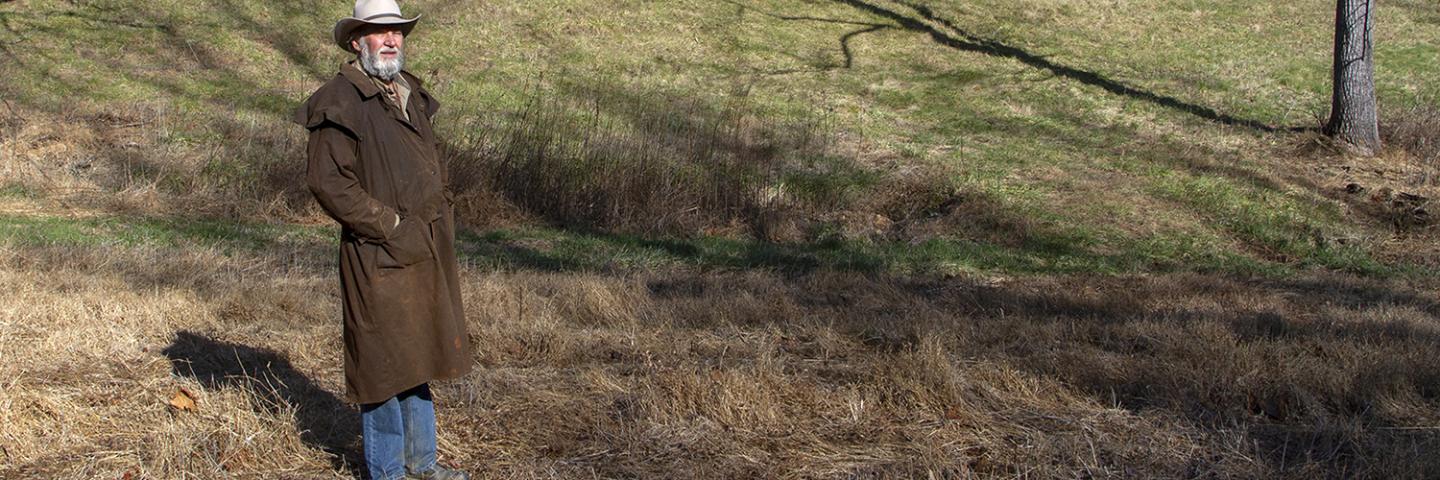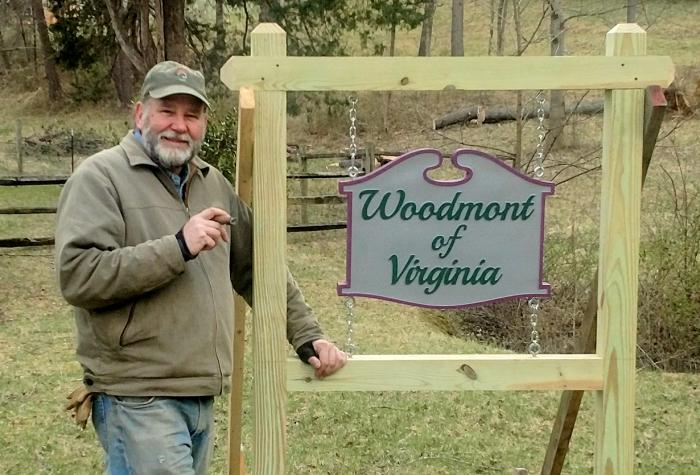Cattleman 'Bridges' Gap Between Past and Present to Honor Family Legacy

David Bridges of Franklin County, Va., has worn many hats, but today he is living his dream as a historian and conservationist.
Franklin County cattleman David Bridges may have reached the point where he needs an extra saddlebag to carry his business cards around.
Bridges describes himself as a novelist, biographer, historian, outdoorsman, theologian, dog breeder and agrarian – which basically covers most of what he’s doing now. In the past, he could have been described with equal accuracy as a college professor, Presbyterian minister, counselor, interfaith military chaplain and Civil War re-enactor.
One title Bridges wouldn’t want overlooked, however, is “conservationist.” He regards preservation and care for his land as both an imperative and a legacy.
Bridges, 58, is a grandson of Henry Percival Bridges (1878-1957), who was both the heir to a family mining company and a successful Baltimore attorney. In 1906, Bridges was an organizing member of a syndicate that eventually purchased 3,500 hillside acres near Hancock, Md. The property had been the previous home of the Woodmont Rod and Gun Club, a pastoral retreat for Gilded Age sportsmen that had fallen into disuse after a fire destroyed the clubhouse in 1903.
Bridges was the new club’s secretary/manager and de facto leader for the next 51 years. He presided over a second era of prosperity at Woodmont that continued through the mid-1990s, when the Maryland Department of Natural Resources and the Izaak Walton League teamed to purchase the property. Woodmont remains the home of a private outdoorsmen’s club but is now occasionally open to visitors as a state park and wildlife preserve.
Six U.S. presidents had the pleasure of fishing, hunting and/or dining there. A rocking chair in the “modern” clubhouse (built in 1930) is draped with an American flag and awaits the next to visit. David Bridges returns to hunt and fish at least once every year.
“My grandfather died six years before I was born,” he recounted, “but I’ve read almost every preserved word that he wrote and I feel that I really know him, perhaps even more than my father did.”

After 25 years in ministry, Bridges retired and turned his mind toward recreating the Woodmont experience on a much smaller scale. This idea led him in 2017 to a 261-acre farm near Callaway that he’s named “Woodmont of Virginia.”
Bridges continues family traditions such as training bird dogs, hunting, fishing, raising beef cattle and raising vegetables on his land. (Photo courtesy of David Bridges).
One of his first steps was developing a conservation plan. His grandfather’s ambition for the original Woodmont was for it to be “the best of its kind – a true sportsman’s paradise,” and Bridges aspires to no less.
Henry P. Bridges believed that outdoorsmen and sportsmen had a responsibility to use land responsibly and to preserve wild game for future generations. He was particularly active in efforts to rescue the Eastern wild turkey, thought to be in danger of extinction 100 years ago. Over the course of his life, an estimated 60,000 wild turkeys were hatched on the grounds of Woodmont in Maryland. Some were released into the wild and others sold to state game farms.
“That Woodmont was designed to be self-sustaining. Everything they ate in the dining room was usually caught or grown on the estate. What drew me to this land was its ability to support a similar, self-sustaining operation.”
Very little of what Bridges needed, however, was in place when he purchased his acreage in Franklin County. He made an early contact with District Conservationist Eric Capps in the Natural Resource Conservation Service’s Rocky Mount field office to lay out his plans.
“David isn’t a typical farmer and he didn’t have typical goals,” Capps recalled, “but he did have a strong commitment to doing everything the right way. He’s never changed on that.”
Bridges determined that owning a small herd of Black Angus beef cattle would help him fund his vision. He took the first steps toward developing a managed grazing program before he’d purchased his first steer. With assistance from NRCS, he is currently pasturing between 20 and 30 head on 50 acres.
As a beginning farmer, Bridges was eligible for NRCS’ Environmental Quality Incentives Program (EQIP), which assisted him with the costs involved with excluding his cattle from a stream which runs through his farm. Ultimately, his herd was fenced out of the creek and wooded areas, temporary fencing was installed for rotational grazing, two stream crossings were built and an alternative watering system installed.
“What I liked most about the project,” recalled Capps, “is that it protects the headwaters of the Turners Creek-Pig River watershed from water quality degradation. If our headwaters become degraded, then everything that’s downstream – rivers, lakes or estuaries – is impacted.”
“I also want to restore a bobwhite quail population,” Bridges said. “An NRCS biologist came out to the farm, told me what I needed to do and came up with a plan. I have eight acres of habitat for quail and other wild birds and another 25 acres of food plots for wild game. I’m also planning to plant an additional 30 acres in quail habitat.”
This year’s COVID-19 pandemic forced Bridges to call a temporary halt to another of his revenue sources, week-long “enclaves” for writers seeking to become novelists. Bridges, who taught a course in writing such books at the University of Richmond’s School of Continuing Education from 2013 through 2015, is the instructor.
He draws extensively from his four published works and a novel in progress. One of his novels features Maj. James Breathed, Bridges’ great-great uncle and a Confederate officer and physician during the Civil War, as the protagonist. Bridges also has written and published “The Bridges of Washington County,” which focuses on the life of his grandfather and his work at Maryland’s Woodmont.
Enclave itineraries featured a mix of lectures and seminars, but Bridges also built in plenty of time for hiking, working cattle and training farm-bred English Setter puppies as bird dogs. He cancelled all workshops planned for 2020 but has two set up for next summer if conditions permit.
“I must have looked at 25 other farms before I settled on this one,” Bridges said, “and I’ll always be thankful that Eric Capps and NRCS were one of my first contacts. Eric’s both a gentleman and a scholar and his ability to see my vision has always been extraordinary. I was hoping to find someone with a true passion for conservation and Eric conveys that. I’d like to get the writers’ enclaves back on schedule, but I know I’m in the right place.”
In “The Bridges of Washington County,” David Bridges quotes his grandfather as saying he felt his accomplishments as a conservationist were the most significant aspect of his life.
“I grew up in Chicago, but always dreamed of being a farmer,” Bridges said. “At age 21, I was fresh out of college with an Ag Economics degree and ready to take on the world as a cattleman. It’s 37 years later, but I’m finally doing it. My grandfather realized many of his dreams, and now I’m living mine.”

